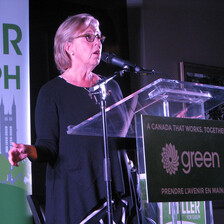The Electronic Intifada 24 April 2013

The Jewish National Fund enjoys tax-exempt status in Canada.
ActiveStillsIn 2010 the Canada Revenue Agency was asked whether it would “investigate or revoke” the Jewish National Fund’s charitable status, internal documents seen by The Electronic Intifada show. But this request seems to have been ignored in deference to a “charity” that has long participated in the erasure of Palestinians’ presence from their historic homeland.
Through an access to information request, Montreal-based activist Ron Saba received dozens of Canada Revenue Agency documents concerning the Jewish National Fund (JNF) of Canada in March (documents may be viewed at the end of this article).
In probably the most explosive revelation, the Canada Revenue Agency was questioned if it would revoke the charitable status of the JNF: “If a registered charity undertakes illegal activities abroad, what action will the CRA take? Will the CRA investigate or revoke the registered status of the Jewish National Fund?”
While the document does not make clear who authored it, context suggests it came from Canada’s Auditor General.
Released by the Canada Revenue Agency after Saba’s freedom of information request, the document takes the form of questions and answers based on Chapter 7 of the 2010 Fall Report of the Auditor General of Canada. The JNF is the only specific charity to be challenged in the 30 questions, most of which address issues of performance and targets.
The CRA did not return emails or phone messages from Saba seeking to clarify whether the Office of the Attorney General authored the document.
JNF violates Canadian law
Shutting out Palestinian citizens of Israel, JNF lands can only be leased by Jews. A 1998 United Nations Human Rights Council report finds that the JNF systematically discriminates against Palestinian citizens of Israel, who make up about 20 percent of the country’s population. According to the UN report, JNF lands are “chartered to benefit Jews exclusively,” which has led to an “institutionalized form of discrimination” (UN Committee on Economic, Social and Cultural Rights, “Consideration of Report Submitted by States Parties Under Articles 16 and 17 of the Covenant,” 14 December 1998, E/C.12/1/Add.27).
In 2005, Israel’s high court came to similar conclusions. It found that the JNF, which owns 13 percent of the country’s land and has significant influence over most of the rest, systematically excluded Palestinian citizens of Israel from leasing its property (“A racist Jewish state,” Haaretz, 20 July 2007).
There is a strong case to be made that the Jewish National Fund’s bylaws and operations violate Canadian policy and law. Discrimination in the provision of housing is illegal under the Canadian Human Rights Act. And a September 2003 Canada Revenue Agency public policy statement titled “Registering Charities that Promote Racial Equality” makes clear that racial equality is a stated aim of Canadian charitable policy.
Registered charities that operate abroad are supposed to adhere to domestic policy or else lose their ability to provide donors with tax subsidies. “An organization is not charitable at law if its activities are contrary to Canadian public policy,” explains the Canada Revenue Agency.
But the CRA and politicians in Ottawa have shown little interest in applying the rules in the Jewish National Fund’s case. They seem to have ignored the call to investigate whether the JNF’s practices contravene Canadian law. In particular, the CRA has not properly addressed the question of whether the JNF is a racist organization.
The internal documents suggest the CRA has spent hundreds of hours devising strategies to respond to complaints about the JNF and covering up what Ron Saba has dubbed “the Racist JNF Tax Fraud.”
Protecting the JNF
This public relations strategy is spelled out explicitly in a document of “Media Lines” on the JNF prepared for use by the Canada Revenue Agency’s media handlers — another of the documents released to Ron Saba.
It notes that Saba has been “questioning the legitimacy of the charitable status of the JNF” through a “wide distribution list, including members of Parliament, senators, Canadian and international media and human rights and social justice groups.” The document also expresses concerns that while “the JNF has not generated any mainstream media coverage” so far, “because of Mr. Saba’s wide distribution list, the potential for media interest remains.”
The document then specifies some general lines about information access requests and charities, along with several specific lines on the JNF. The latter do not address the reality of the JNF’s racist policies that exclude non-Jews. Instead they claim that the “Federal Court of Appeal has ruled, in the [2002] case of Canadian Magen David Adom for Israel v Canada, that there is no clear public policy prohibiting charitable activities in the Occupied Territories” — avoiding the point.
In what seems to be part of this effort to protect the JNF from scrutiny, Foreign Affairs spokesperson Caitlin Workman emailed Canada Revenue Agency media spokespersons in 2011, suggesting they “monitor” an Independent Jewish Voices sponsored talk in Ottawa.
Under the headline “Event you may want to monitor,” Workman sent a 13 May 2011 communication stating “author of the Black Book of Canadian Foreign Policy, Yves Engler, will give a talk on Canada and the Jewish National Fund.”
The tax agency’s protection should not be surprising. Conservative officials have strongly backed the JNF — even though the internal documents show that since 2007, six different Conservative ministers have received documentation detailing the racist nature of JNF policies (at least two of the ministers circulated the information).
Challenges and successes
Over the past nine months, immigration minister Jason Kenney and foreign minister John Baird have spoken at Jewish National Fund galas, while environment minister Peter Kent toured southern Israel with officials from the organization in December. At the end of the year, Prime Minister Stephen Harper is set to be honored at the JNF Negev Dinner in Toronto, which will be the first time a sitting Canadian prime minister has spoken to a JNF gala in the organization’s 100-year history.
Hopefully, Harper will be greeted by protesters. While getting the prime minister to speak is obviously a boon for the JNF, it also provides a unique opportunity to draw attention to an institution that most people are unfamiliar with.
It’s time to turn Independent Jewish Voices’ nascent campaign to revoke the JNF’s charitable status into a major element of pro-Palestinian activism in Canada. Groups elsewhere have had successes on this front recently.
In 2011, Stop the JNF in England sucessfully pushed Prime Minister David Cameron to withdraw his patron status from the JNF. Additionally, 68 members of parliament have endorsed a call to revoke the organization’s charitable status because “the JNF’s constitution is explicitly discriminatory by stating that land and property will never be rented, leased or sold to non-Jews.”
In Scotland, the Green Party and Friends of the Earth have endorsed the Stop the JNF campaign and the Green Party of England and Wales have also called for JNF to lose its charitable status. In 2011, legendary US folksinger Pete Seeger distanced himself from a previous event with the JNF, and a board member of the US organization quit in protest over the JNF’s role in the eviction of a Palestinian family from East Jerusalem. And at the start of this year, Stop The JNF prompted the new owners of a major South African toy retailer, Reggies, to sever ties with the organization.
While the political climate is more difficult in Canada, there’s no reason that a major campaign can’t bring successes. If made aware, most Canadians would be uncomfortable with the idea that public money is supporting an openly racist institution. They would also be appalled by the JNF Canada’s direct (and documented) role in displacing Palestinians since the late 1920s.
While it’s hard to imagine the Canada Revenue Agency (under Stephen Harper) revoking the Jewish National Fund’s charitable status — at least without a lengthy and expensive legal battle — the campaign can play an important educational role. The organization is at the heart of Israeli apartheid and drawing attention to this institution is a way to discuss the racism intrinsic to Zionism.
Yves Engler’s latest book is The Ugly Canadian: Stephen Harper’s foreign policy. He is also the author of Canada and Israel: building apartheid.






Comments
Ever since 2006, the stance
Permalink K Renner replied on
Ever since 2006, the stance of the federal government in Canada on Palestine has been an ugly and stupid joke. Harper= lunatic.
priorities
Permalink Eric replied on
Typical Canadian government response to requests to investigate illegality:
if it doesn't match Conservative political policy, investigate the requester instead.
And then lecture other countries about the rule of law.